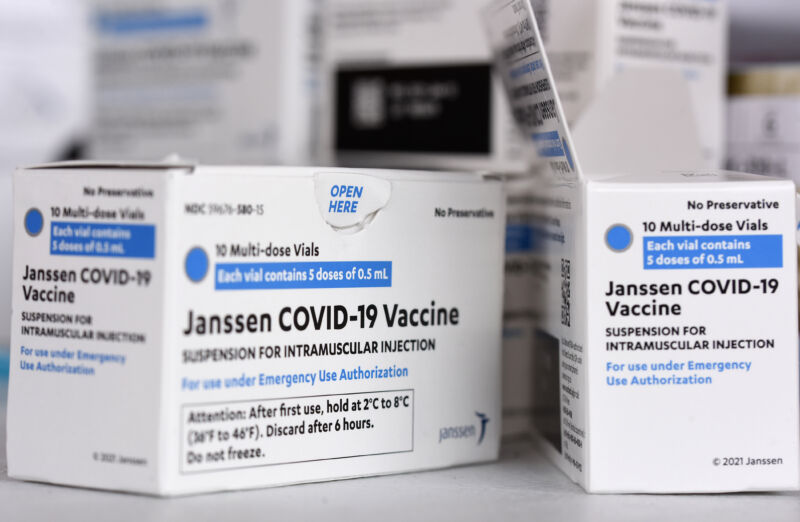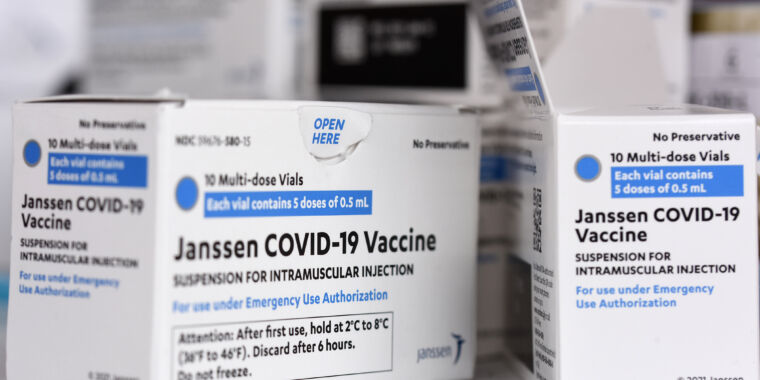
The Food and Drug Administration has revoked Johnson & Johnson’s COVID-19 vaccine license, ending its short-lived but troubled existence amid the pandemic.
In a letter last week, the FDA’s chief vaccine regulator, Peter Marks, wrote to Janssen Biotech — the Belgium-based Johnson & Johnson company responsible for the vaccine — saying the agency was withdrawing the license. Marks opened the letter by noting that the retraction was at the request of the company.
According to Marks, Janssen’s May 22 letter informed the FDA that:
the last batches of the Janssen COVID-19 vaccine purchased by the U.S. government have expired, that there is no demand for new batches of the Janssen COVID-19 vaccine in the United States, and that Janssen Biotech, Inc. plans to update the strain composition of this vaccine to address emerging variants.
Last month, the Centers for Disease Control and Prevention reported on their website that the vaccine was no longer available in the US because remaining government supplies had expired on May 7, 2023. According to data from the CDC, about 31.5 million doses of J&J vaccine administered were delivered to states during the pandemic, but only about 19 million were administered, leaving the remaining about 12.5 million to expire.
The beginning of the end for the once promising single-dose vaccine came just weeks after FDA approval on Feb. 27, 2021. On March 13, 2021, the FDA and CDC halted use of the J&J vaccine over concerns of an extreme rare clotting disorder, which was first noticed with a similar vaccine made by AstraZeneca. Both vaccines used an adenovirus vector-based design, although the AstraZeneca vaccine was never approved for use in the US. The hiatus on J&J’s vaccine lasted just 11 days, but the damage was done and demand for the vaccine plummeted, never to recover.
Meanwhile, US production of the vaccine has been hampered by the scandal surrounding Emergent BioSolutions, a government contractor that ruined tens of millions of J&J COVID-19 vaccine doses due to quality control issues and contamination. Despite raking in hundreds of millions of dollars from government contracts, Emergent had a history of manufacturing violations.
In December 2021, the CDC downgraded J&J’s vaccine, saying the mRNA-based vaccines should be the vaccines of choice against COVID-19. And in May 2022, the FDA restricted the use of the vaccine to those ages 18 and older who could not or would not receive an alternative vaccine.
The full withdrawal this month comes as the FDA prepares to discuss new formulations of COVID-19 vaccines for this fall. The FDA has long held to the idea of updating COVID vaccinations, similar to annual flu vaccinations: reviewing vaccine formulas in late spring/early summer to push manufacturers to have updated formulas ready for fall rollout. The agency’s vaccination advisory committee will meet on June 15 to discuss the best formula for this fall.
The World Health Organization’s Vaccine Advisory Committee has already recommended that countries should switch to monovalent vaccines this year targeting the XBB line, the newest omicron subline dominating transmission. In a May 18 statement, WHO advisers recommended that countries scrap current bivalent formulas — which target both the ancestral SARS-CoV-2 virus and an omicron subvariant — as continuing to target the ancestral strain would protection against current strains. In addition, retaining the ancestral strain in the injections “reduces the concentration of the novel target antigen(s) compared to monovalent vaccines.”
The FDA advisor meeting on June 15 will discuss reformulations that will apply to mRNA vaccines made by Pfizer-BioNTech and Moderna. Novavax, which is making a protein-based vaccine available in the US, is also working on an updated COVID-19 shot against XBB strains.

